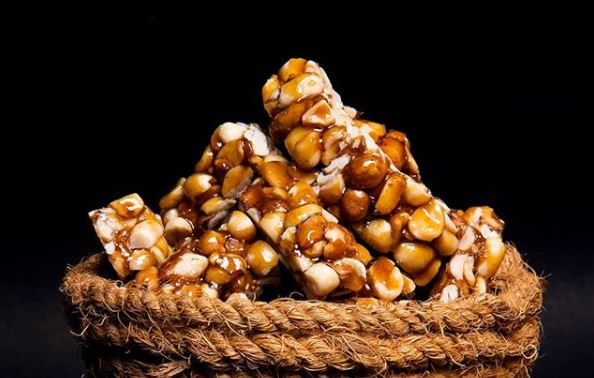
Roasted peanuts and crushed jaggery is all it takes to make Kadalamittai, an Indian sweet delicacy, but not everybody can give the traditional touch and the crispiness that Kovilpatti gives. The Kovilpatti Kadalamittai was granted the GI tag recently by the Office of the Controller General of Patents, Designs and Trademarks. But the humble dish had to wade through several obstacles to get this recognition. Just like its appearance, this sweet dish also has a humble journey to it.
The ‘sweet’ history of Kovilpatti Kadalamittai
Manufactured in and around Kovilpatti and other villages of Thoothukudi district, the dish was first prepared by Ponnambala Nadar who had a grocery store in the Bazaar area in 1940s. He decided to put the extra peanuts that he had in his store to make Kadalamittai. The dish in itself was not something new as back in those days, villagers used to make balls of peanut crushed with jaggery. However, it would stay fresh for not more than 3 days. Krishnamoorthy, a 75 year old resident of Kovilpatti recalls that his uncle (father’s brother) Ponnambala Nadar improvised on this by caramelizing the jaggery which enhanced its shelf life and voila, the Kovilpatti Kadalamittai was born. Later, Ponnambalam Nadar started a separate unit to manufacture Kadalamittai under the brand “Baby”, named after his daughter. Sweet.
The ‘bitter’ struggle of Kovilpatti Kadalamittai
The process for acquiring GI started back in 2014. Mr. Vijayakarthikeyan IAS, currently leading the fight against COVID-19 in Tirupur, took mission of getting the GI tag for Kadalamittai when he was the Sub Collector of Kovilpatti. He convened a meeting that was attended by more than 15 manufacturers of Kadalamittai in the region and made them realize the importance of having the GI tag. He explained to them that the GI tag was necessary to preserve the authenticity and also to boost the market value of the product. He also made the manufacturers realize how other manufacturers outside Kovilpatti are selling off their Kadalamittai as Kovilpatti’s, thereby affecting local manufacturers, their sales and market. So, in 2014, Mr. Vijaykarthikeyan filed an application for the GI tag from his side. However, the application was returned in 2015 citing that individuals, organizations or government servants cannot apply and that only associations were eligible to do so. After his transfer, the cause was put in the backseat.
The issue again gained momentum, thanks to GST. Initially, Kadalamittai attracted a GST rate of 18% as it was considered as an item under confectionaries and not under sweet meat that had a 5% GST rate. The issue became a talking point after memes that compared GST rates of pizza and kadalamittai went viral. Manufacturers then formed an association in 2016 to lobby for a reduction of GST rates. Nirmala Sitharaman, the then Minister for Commerce and Industry gave clarity and created a separate item called Kadalamittai with 5% GST.
As Kadalamittai made news, it grabbed the attention of Sanjay Gandhi, a nodal advocate for GI in Chennai. He took it up and reached out to the manufacturers. The manufacturers formally registered themselves as Kovilpatti Kadalamittai Manufactureres and Retailers Association and filed a fresh application in 2017. Dhinesh Rodi, the CEO of Namo Candy and the Treasurer of the association said that they produced evidences that would strengthen the case. People like Krishnamurthy and other documentary evidences like photos, old news articles, advertisements, were used as evidences.
But it doesn’t matter if you are living human or a Kadalamittai, you have to pass through the firewall of Indian bureaucracy. The process was getting delayed due to several bureaucratic procedures. Later, the association met Kadambur Raju, the ADMK MLA for Kovilpatti who pursued the matter with the current Minister for Commerce and Industry Piyush Goyal.
The arduous journey came to an end a few days back when it was notified in the gazette that Kovilpatti Kadalamittai had been given the GI tag.
What makes Kovilpatti Kadalamittai unique?
The Kovilpatti Kadalamittai comes in the form of rectangular cuboids. Groundnuts grown in native black soil, vellam (jaggery) from the cottage industries in around the district and water from the Thamirabarani river enhances its taste naturally.
How will GI tag help?
With the dish getting the GI tag, no other individual or manufacturer can sell their product as Kovilpatti Kadalamittai. This will help in adding brand value to the Kadalamittais coming out of Kovilpatti and will also help the local manufacturers of the region tap into national and international markets thereby boosting the local economy.




